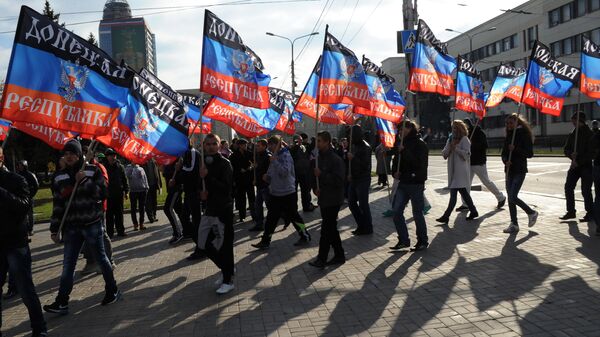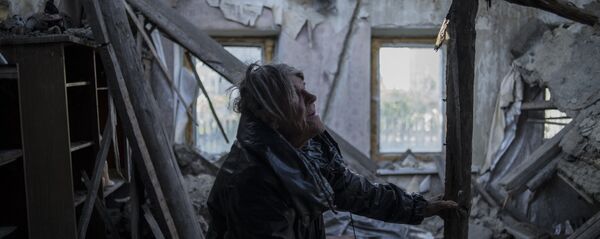DONETSK (Sputnik) — Self-proclaimed Donetsk People's Republic (DPR) Leader Alexander Zakharchenko proposed on Tuesday a three-year transition period toward a new state called Malorossiya ("Little Russia") as a way to settle the three-year conflict.
"We propose to establish the state of Malorossiya. Malorossiya is an independent young state. A transition period of up to 3 years," Zakharchenko told reporters.
Noting that discussions within the DPR had "come to the conclusion that Ukraine has shown itself as a failed state," he called on the international community to support his proposal.
"We should be supported by the residents of the regions. This solution is possible provided that the international community supports the idea," Zakharchenko said.
Malorossiya has been declared as a sovereign federation of states with wide-ranging autonomy, with the capital of Donetsk and successor state to Ukraine. The new state's constitution will be approved after a referendum and broad discussion. The country's central authorities will be in charge of the federal budget, army and security services, according to DPR Income and Charges Minister Alexander Timofeev.
"We, the representatives of former Ukraine, declare the establishment of a new state, Malorossiya, which is a successor state to Ukraine. We agree that the new state's name will be Malorossiya because the very name of Ukraine has discredited itself. The city of Donetsk becomes Malorossiya's capital," Timofeev said while reading a constitution act on the formation of the new country.
Malorossiya's constitution will state its non-aligned status and policy toward restoring ties with Russia, he added. The new country will seek to join the union state of Russia and Belarus while keeping its sovereignty.
"Malorossiya is a multinational state with Russian and Malorossiyan being its official languages, and regional languages retaining their rights and statuses," Timofeev read.
He noted that in Malorossiya, religions will have equal rights. The state aims at resuming activities within the Commonwealth of Independent States (CIS) and launching trilateral talks with Russia and the European Union.
"The policy aimed at joining the Union State of Russia and Belarus while preserving independence and sovereignty. The keeping of a visa-free regime in agreement with the European Union. De-oligarchisation, uncluding on a legal basis," the minister read out.
In February 2015, Kiev forces and Donbass independence supporters signed a peace agreement in the Belarusian capital of Minsk. The deal stipulates a full ceasefire, weapons withdrawal from the line of contact in Donbass, as well as constitutional reforms that would give a special status to the Donetsk and Lugansk People's Republics. Despite the agreement brokered by the Normandy Four states (Russia, France, Germany and Ukraine), the ceasefire regime is regularly violated, with both sides accusing each other of multiple breaches, undermining the terms of the accord.
"The constitution of Malorossiya will be drafted, approved in its initial iteration by the constitutional assembly and then submitted for the nationwide referendum. This will follow the wide public discussion both on the regional and the federal levels," Timofeev pointed out.
Zakharchenko suggested declaring a state of emergency in Malorossiya for three years due to "economic difficulties, possible chaos and a possible war of all against all", and during these three years order shall be restored and the constitution shall be adopted.



